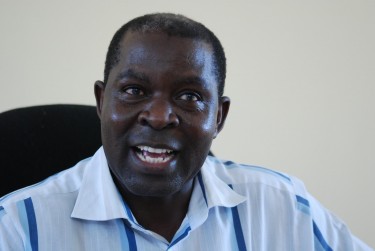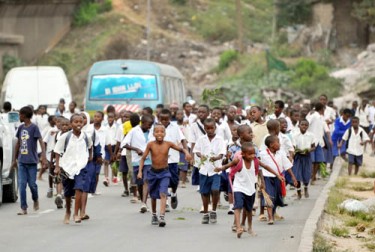Teachers in Tanzania have been on a strike to urge the government to pay their unpaid dues [1] and to improve their benefits, working conditions and salaries. The strike came after the Teacher's union (Chama Cha Walimu-CWT), through their president Mr.Gratian Mukoba, gave the government a 48-hours notice on 28 July, 2012. The strike started on 30 July and lasted for four days. According to the CWT, the strike had the support of 97.5% of the teachers, [2] in primary, secondary and teaching institutions.

President of the Teachers Union of Tanzania, Bw. Gratian Mukoma. Photo courtesy of Straikamkali blog
Social networks users in the country have been following the strike closely to determine the impact of the strike planned a few days before the national census [3] slated to happen on August 26, 2012.
The JamiiForums [4] network that is used by an average of 10,000 people per minute, posted news on the countrywide happenings of the strike. [1] Some of the users of this network narrated what was happening in their specific regions.
Rymg [5]from Mwanza had this to say:
As at now, students from the Ilemela district, Mwanza Province are having demonstrations with different banners, stating”We want our rights and justice” as they headed to the Judicial Courts In Ilemela district to open a case against the teachers for failing to teach them.
Agapetc [6]from Korogwe had this to say:
Teachers from the committee of the town and province of Korogwe, have striked in an effort to join their leaders who announced the strike. In many schools only the head teachers and senior staff attended to their duties. It is also clear that, secondary school teachers are leading in the strike while some primary school teachers reported to work.
 [7]
[7]Students from one of the primary schools in Dar es Salaam as they demonstrate with a plea to the government to help end the teacher's strike. Photo courtesy of: khals-tanzanphotobank.blogspot.com
In other parts of the country their were stories of the students demonstrating being dispassed by the authorities. Naytsory [8] described the happenings in Hanang:
Students from Mahu Secondary in Hanang, have blocked the road to Singida using their desks. Currently, the police and education officers are here to help try and solve the situation.
More than 90%of the teachers have joined the strike.In the schools, are only the school administrators, field teachers and volunteers. In primary schools only the head teachers are there.
Through his Facebook page, Patrick Lusiano Tsere [9], was against the strike, saying that it aims to disrupt the planned national census. He said that teachers should be the senior secretaries in making this exercise fruitful:
Don't you know that this census is costing this country a lot of money?! Do you understand the impact of not letting the census happen?! As a teacher, you do not follow the lawful ways to demand your rights and instead your encourage others to disrupt the census. In your organization, following the claims that have been outlined for you by the law, is their a clause that gives you the right to blackmail the government? If, that is the attitude of our teachers, then our children without a doubt will have poor manners and etiquette.
John Mughobi Sagatti [10] is of a different view:
Yasinta Ngonyani, the blogger Life and Success [11] displayed a picture of a student teaching other students following the strike, and added the caption below [12]:
When the student decides to take the teacher's role, then it becomes clear that the teacher plays an important role in the children's lives.
Ramadhani Msangi, blogger of Freepodium [13] added videos of the strike [14] .
On twitter the discussions continued:
Yericko Nyerere @YerickoNyerere [15] :
I await my president's speech @jmkikwete as I do not know what he will say since last month he said that his government is not involved in Ulimboka. What about the teacher's strike?
Haki Elimu @HakiElimu [16]those who collected the news from different parts of the country:
Look at the damage of the strike in Tabora here [17] #okoaelimu #changetanzania
Rama S Msangi @mchambuzi [18]:
I uploaded a @YouTube video [19] about the strike in Musoma.
As the strike continued the president Jakaya Kikwete, spoke to various news editors on 1st August 2012.
Irenei Kiria @Irenei2011 [20] asked on twitter:
I ask of those who have been following the strike to please keep us informed on the presidents verdict on the strike.
From JamiiForums one response came through saying that the teacher's claims were impractical [21]. Sister Subi of the wavuti blog added the president's speech and voice to her blog [22].
TheHabari [23] blog noted the brief statement [24] by Haki Elimu @HakiElimu [16] an organization that deals with matters related to education in the country, on the strike:
HakiElimu insists that the education sector in the country will only improve if teachers get better working conditions, they are involved in decisions regarding the education sector and giving them on the job training.Good education cannot be delivered by de-motivated teachers.
The blog continues:
The government leaders should not ignore the teachers’, because by doing that they will demotivate them. Even though the teacher's did not study for as many years as people in other professions, they play a very important role. They prepare today and tomorrow's citizens’ in terms of focus and knowledge. Thus their demand for better conditions, is their right and the government should fulfill its obligation by listening and consulting with them without ridicule.
On Thursday, August 2nd , 2012, the High Court under the work section declared the strike illegal as it was not planned lawfully.The Mjengwablog reported: [25]
The court has declared the teacher's strike illegal as it did not follow the right procedures.The court has also ordered CWT to pay for damages to students who were affected by the strike.
The teacher's strike followed shortly after the doctor's strike [26] .There are still those who believe that the doctor's strike was not addressed.